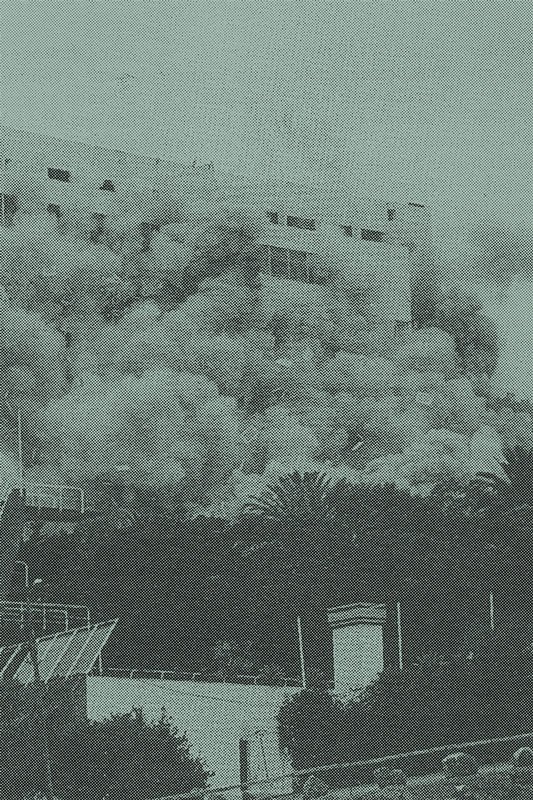 Image 1 of 7
Image 1 of 7

 Image 2 of 7
Image 2 of 7

 Image 3 of 7
Image 3 of 7

 Image 4 of 7
Image 4 of 7

 Image 5 of 7
Image 5 of 7

 Image 6 of 7
Image 6 of 7

 Image 7 of 7
Image 7 of 7








Atlantis / Pedro Ramos
The Second Law of Thermodynamics, which states that the entropy of an isolated system will tend to increase over time, is used in physics to explain why we experience time as moving forward; why eggs once broken don’t un-break or buildings once demolished don’t spring miraculously back from the rubble and dust. It’s what is known as the arrow of time.
Atlantis by Pedro Ramos is an exercise in dismantling this simply linear notion of time. It takes as its subject the implosion of the Atlantis hotel on the island of Madeira, Ramos’ birthplace. Originally built in 1972 to capitalise on the burgeoning tourism industry, the Atlantis hotel was demolished in 2000 to make way for the expanding airport, ironically bringing in the very tourists the hotel was built to accommodate. The implosion was barely a footnote in history, however, in Atlantis, Ramos uses it as a means to explore how the same event can take on multiple meanings depending on the perspective - the personal or the historical.
The images in Atlantis are taken from original news footage of the implosion found online, they are degraded and blurred, showing their own signs of entropy. By fracturing and re-sequencing the footage Ramos is able to summon the building back from the debris in order to watch it come crashing down again, allowing him to enliven and re-imagine his own faded memories of the event. Technology has allowed us to restructure our memories.
On an historical timescale Atlantis can be read as an allegory for the experience of modernity, a world of perpetual destruction and renewal where the same forces which bring things into being are just as quickly their undoing, as Marx would say a world in which “all that is solid melts into air.”
The Second Law of Thermodynamics, which states that the entropy of an isolated system will tend to increase over time, is used in physics to explain why we experience time as moving forward; why eggs once broken don’t un-break or buildings once demolished don’t spring miraculously back from the rubble and dust. It’s what is known as the arrow of time.
Atlantis by Pedro Ramos is an exercise in dismantling this simply linear notion of time. It takes as its subject the implosion of the Atlantis hotel on the island of Madeira, Ramos’ birthplace. Originally built in 1972 to capitalise on the burgeoning tourism industry, the Atlantis hotel was demolished in 2000 to make way for the expanding airport, ironically bringing in the very tourists the hotel was built to accommodate. The implosion was barely a footnote in history, however, in Atlantis, Ramos uses it as a means to explore how the same event can take on multiple meanings depending on the perspective - the personal or the historical.
The images in Atlantis are taken from original news footage of the implosion found online, they are degraded and blurred, showing their own signs of entropy. By fracturing and re-sequencing the footage Ramos is able to summon the building back from the debris in order to watch it come crashing down again, allowing him to enliven and re-imagine his own faded memories of the event. Technology has allowed us to restructure our memories.
On an historical timescale Atlantis can be read as an allegory for the experience of modernity, a world of perpetual destruction and renewal where the same forces which bring things into being are just as quickly their undoing, as Marx would say a world in which “all that is solid melts into air.”
The Second Law of Thermodynamics, which states that the entropy of an isolated system will tend to increase over time, is used in physics to explain why we experience time as moving forward; why eggs once broken don’t un-break or buildings once demolished don’t spring miraculously back from the rubble and dust. It’s what is known as the arrow of time.
Atlantis by Pedro Ramos is an exercise in dismantling this simply linear notion of time. It takes as its subject the implosion of the Atlantis hotel on the island of Madeira, Ramos’ birthplace. Originally built in 1972 to capitalise on the burgeoning tourism industry, the Atlantis hotel was demolished in 2000 to make way for the expanding airport, ironically bringing in the very tourists the hotel was built to accommodate. The implosion was barely a footnote in history, however, in Atlantis, Ramos uses it as a means to explore how the same event can take on multiple meanings depending on the perspective - the personal or the historical.
The images in Atlantis are taken from original news footage of the implosion found online, they are degraded and blurred, showing their own signs of entropy. By fracturing and re-sequencing the footage Ramos is able to summon the building back from the debris in order to watch it come crashing down again, allowing him to enliven and re-imagine his own faded memories of the event. Technology has allowed us to restructure our memories.
On an historical timescale Atlantis can be read as an allegory for the experience of modernity, a world of perpetual destruction and renewal where the same forces which bring things into being are just as quickly their undoing, as Marx would say a world in which “all that is solid melts into air.”
Signed by Pedro Ramos
2015
Try Hard Editions
96 pages
13,4 x 20,1 cm
Softcover
Offset Print
First Edition
Edition of 300 copies
ISBN 978-0-646-94395-4
